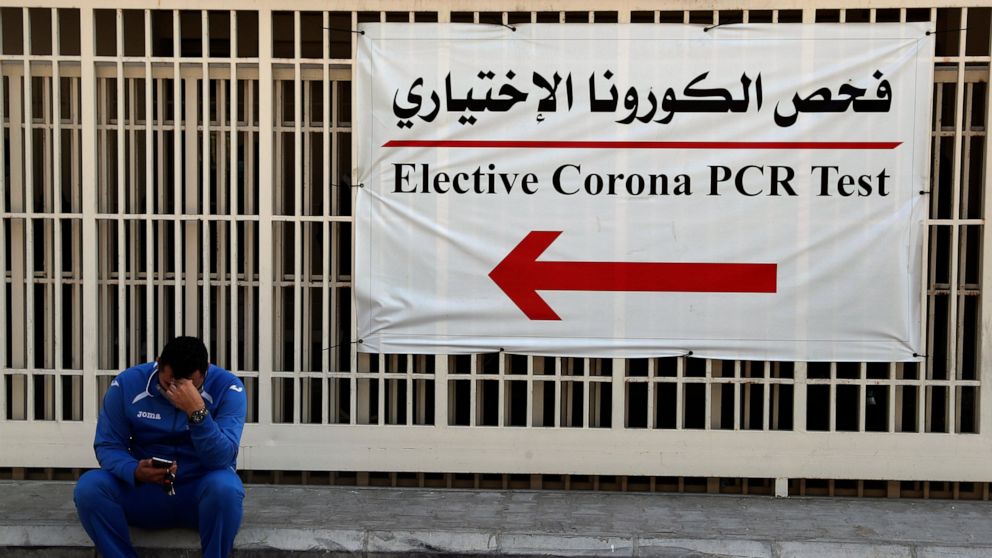
By SARAH EL DEEB and FADI TAWIL Associated Press- BEIRUT — Lebanese authorities tightened a nationwide lockdown Monday, including an 11-day, 24-hour curfew, amid a dramatic surge in coronavirus infections and growing criticism of uncoordinated policies many blame for the spread of the virus. News of the restrictions to be implemented starting Thursday morning sparked panicked grocery buying as people lined up outside of supermarkets to stock up, raising fears the crowds could further spread the virus. Lebanon had only just announced a nationwide lockdown last week. But many, including the health minister and officials on a government committee, considered it to be too lenient because it exempted many sectors, such as florists, plant nurseries and factories. Hospitals, meanwhile, were running out of beds amid rapidly multiplying COVID-19 cases.
Critics have said uncoordinated and hesitant policies wavering between relaxing restrictions and shutting down were behind the failure to contain the virus. For instance, despite a rise in infections, the government relaxed restrictions ahead of Christmas and New Year’s celebrations, hoping to boost a crumbling local economy as thousands of Lebanese expats arrived in the country. Bars and nightclubs, which had been ordered shut for months, were allowed to open. Daily infection rates have since hovered above 3,000, hitting an all-time high of over 5,000 last week. Doctors and experts say the extent of the spread has yet to be felt, predicting numbers will skyrocket in the coming days, overwhelming health facilities in the country of nearly 6 million. Despite the nationwide lockdown announced last week, a soccer match was allowed to take place in the northern Tripoli province on Sunday with an audience and was aired on TV.
The spike in cases has exhausted the health care sector, prompting lawmakers and officials to call on the government to consider a 24-hour lockdown without exemptions, and to shut down the airport. Panicked shoppers swarmed supermarkets following reports they would only be allowed to take delivery orders amid the tightened lockdown. Long lines formed outside chain supermarkets and in some cases arguments broke out over shopping carts, sparking fear the crowds could further spread the virus. Merna Jumaa left a packed supermarket in eastern Beirut pushing a cart full of groceries but with no bread. “We came to get bread. There was already not a single piece of bread left,” she said, walking away with her mother. The government declared a “state of health emergency” between Jan. 14-25 that includes a round-the-clock curfew. Lebanon’s caretaker prime minister said earlier that the country has entered a “very critical zone” in the battle against the coronavirus
As of Sunday, the World Health Organization said 81.7% of Lebanon’s hospital beds were occupied and the intensive-care-unit bed occupancy had reached 91.4%, with the highest in Beirut. Some 2,295 health care workers had been infected by Jan. 10, up from 2,015 last week. Kayssar Mawad, director of a private hospital in Zgharta in northern Lebanon, said he has been turning cases away because there were no more beds. Out of 35 patients there with COVID-19, the illness caused by the virus, seven are in ICU, he said. Zgharta is one of the country’s hotspots. “It is a difficult period,” said Mawad. “We are refusing many cases. There are no places, no more respirators.”
Since February, Lebanon has recorded more than 219,000 infections and 1,606 deaths. Hospitals have appealed to the government to turn all health care facilities into locations for treating coronavirus patients, saying all 15,000 hospital beds are needed to meet the new surge. At the largest public hospital in Beirut, Rafik Hariri University hospital, doctors and nurses were overwhelmed with new patients and all 40 ICU beds were occupied. “We are in the heart of the crisis,” said nurse Therese Gobar. Jad Chaaban, a Lebanese economist and political activist, tweeted that Lebanon “is dying” and called it “another chapter” of the “criminal incompetence” of the authorities.
Lebanon’s political class was facing a wave of antigovernment protests before the virus outbreak. The protesters blamed the long-serving political elite for mismanagement. Then, a massive explosion in August in Beirut’s port killed over 200 people and injured thousands. The blast, caused by the ignition of explosive chemicals stored there for years, has been blamed on gross negligence.



